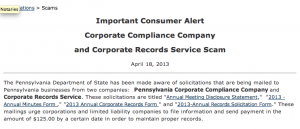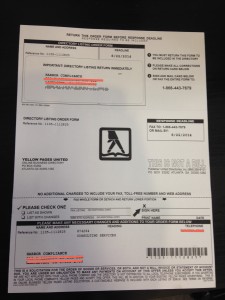-
Software
Compliance Software
Oversee licenses, track renewals, access documents, and more from a single interface.
Software Overview -
Services
Compliance Services
Full service compliance solutions for organizations throughout their entire lifecycles.
Services Overview -
Industries
-
Partner
- Information Center
The Hidden Cost of Business Ownership: Eternal Vigilance
Posted on July 16, 2014 by James Gilmer in Business Compliance.
In the words of Thomas Jefferson, “eternal vigilance by the people is the price of liberty.”
In the world of small business, eternal vigilance has a more tangible value: keeping your business afloat and your information private.
New business owners are particularly vulnerable to dishonest and entirely unlawful practices (aka scams). That’s not a knock on you! You’re simply new to business ownership and corporate filings, and you might be too busy to ignore the warning signs!
Today, I’ll address three scams, targeted towards small businesses, and what you can do to remain vigilant against them.
1. Corporate Filing Scams
Nearly every state’s corporations division has a warning on its front page against some form of scam. Often an organization with an official sounding name, such as the “Corporate Records Service” will claim that your annual minutes, annual records, or other form is due. They’ll call or mail a solicitation, and collect your information and a fee, often a few hundred dollars. Please note, these scam companies mentioned or alluded to have no affiliation whatsoever with Harbor Business Compliance Corporation.
For more information, check out this post on this Pennsylvania-specific scam.
How do I protect myself? Notices and reminders from the state usually go to the registered agent listed on the state’s records, which can be a commercial provider, an individual, or the business itself. These notices will be on official letterhead. If they aren’t – red flag! A good registered agent will able to tell whether the documents it receives are legitimate. Calls from random third-party companies asking for business information are probably not legitimate.
If you have any doubts about what you need to file, check with the state or give us a call. Your state probably knows of any scams, and they certainly know what your business needs to file on an annual basis. Also, we’ve summarized many of your state’s initial and annual requirements in our Information Center.
2. Yellow Pages United
We recently received a document in the mail from “Yellow Pages United” with the command to “return immediately” before the “response deadline.” This has been around for a few years; below is the newest version.
At first glance, it looks like you are paying for a listing in Yellow Pages, the official business directory, and I have to admit, is quite compelling. At closer inspection, you’ll find by signing and mailing your business information, you agree to pay $396.00 to an imitation company, and to sign up for a subscription. Also, you often don’t know whether your information will be distributed or sold.
How do I protect myself? Undoubtedly, there are thousands of similar enterprises. First, check the source. Is the organization behind the solicitation really who they appear or claim to be? Are they implying a connection that does not exist? Second, don’t make a payment or even sign anything you get in the mail before you read the entire document. Know what you’re signing and agreeing to. Third, make smart decisions about where you advertise your business. If it’s sketchy, or you just don’t see the value, don’t do it!
3. Phishing
Phishing is an attempt to induce you to reveal personal information, including credit card numbers, social security numbers, and passwords. It takes the form of emails and faxes, designed to look like a reputable, legitimate company sent them.
Often, these emails will duplicate a company’s email template (even your suppliers and buyers), making it difficult to recognize as a scam. Be wary of clicking links or downloading files, as this is how your information becomes vulnerable.
How do I protect myself? First, if it was in your spam inbox, there’s probably a reason for it. Then, check the sender and the domain (example: harborcompliance.com) of the email. If it’s not the usual source, you might be suspicious. Before clicking a link or downloading something, put your mouse over the link. Your browser will show the destination of that link. If the destination seems strange, or there’s a weird extension on the file (e.g. .exe), don’t click it. Lastly, call the company from whom you think you’ve received a scam email.
Falling victim to these scams can jeopardize your finances, your business information, and potentially your entire business. That being said, please don’t close your browser and become a conspiracy theorist. Owning a business is a great experience, filled with highs and lows, and great clients and partners. Just be smart, be patient, and be vigilant.





